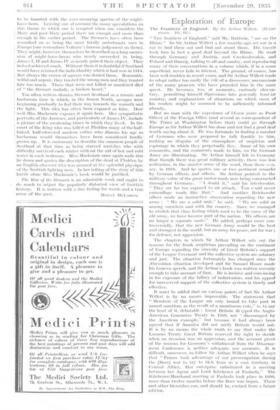Exploration of Europe
The Frontiers of England'. By Sir Arthur Willett. (Heine.; mann. 108. Gcl.) " TnE frontiers of England," said Mr. Baldwin, " are on the Rhine." So Sir Arthur Willert a few months ago set out in a car to find them out and find out about them. His travels took him in fact a good deal beyond the Rhine. He went through Germany and Austria, • and 'Czechoslovakia, and Poland and Danzig, talking to all and sundry, and reproducing many of their conversations in a volume which, if in a sense superficial, never fails in interest. The ground, of course, has been well trodden in recent years, and Sir Arthur Willert tends to adopt rather too easily the T6le of a discoverer,- unconscious 'of the many pioneers who have preceded him in the same quest. He becomes, too, at moments, curiously elekren- tary, permitting himself digressions into generally fami iar country, and explanations of situations on which most of his readers might be assumed to be sufficiently informed already.
But no man with the experience of •111,:cerk years as Press Officer at the Foreign. Office (and several as correspondent of The Times at Washington. before that) could go through Europe as Sir Arthur Willert has done and not find a good deal Worth saying about it. He was fortunate in finding a number of Germans who were prepared to talk frankly to him, making no disguise of the atmosphere of suspicion and espionage in which they perpetually live. Sonic of his own Comments, and the comments made to him, on the German Army are illuminating. Sir Arthur himself felt in. Germany that though there was great military activity, there was less militarism, in the sinister sense of the word, than there .was, say, in 1910. And he quotes one or two pertinent remarks by German officers and others. Sir Arthur pointed to the military value of the great motor-roads now being constructed throughout Germany. " I doubt it," said his interlocutor. " They are far too exposed to. air attack. 'toil cluld never camouflage roads like that." And another Reichswehr officer made an instructive observation regarding the new army : " We arc a solid unit," he said. " We are solid as among ourselves and with the country. Since we managed to abolish that class feeling which -used to be the curse of the old army, we have become part of the nation. We officers are no longer a separate 'caste." He added, perhaps more con- troversially, that the new German Army would be the .best and strongest in the world, but an army for peace; not for war ; for defence, not aggression.
The chapters in which Sir Arthur Willert sets out the reasons for the frank scepticism, prevailing on the continent of Europe regarding the sincerity of Great Britain's support of the League Covenant and the collective system are salutary and just. The situation fortunately has changed since the Abyssinian situation developed and Sir Samuel Hoare made his Geneva speech, and Sir Arthur's book was written recently enough to take account of that. He is incisive and convincing in his exposure. of the fallacy of isolationism, and his appeal for unreserved support of the collective system is timely and
effective: • • • •
It • must be added that on various points of fact Sir Arthur Willert is by no means impeccable. The statement that " Members of the League are only bound to take part in armed sanctions as the result, of a unanimous vote," is. to say the least of it, debatable ; Great Britain dr ipped the Anglo- American Guarantee Treaty in 1919, not " diseouraged by the American example,'' but because it ..had always been agreed that if America did not ratify Britain would not. It is by no means the whole truth to say that under the Locarno Treaty Great Britain reserved the right to decide when an invasion was an aggression, and the account given of the reasons for, Germany's withdrawal from the Disarma- ment Conference is neither adequate nor aceurate It is difficult, moreover, to follow Sir Arthur Willert when he says that " France took advantage of our preoccupation during the [Boer] war to try to filch from us a vast territory in Central Africa. Her enterprise culminated in a meeting between her Agent and Lord Kitchener at Fashoda." The Kitchener-Marchand meeting at Fashoda took place in 1898, more than twelve months before the Boer war began. These and other blemishes can, and should be, excised from a future edition.












































 Previous page
Previous page